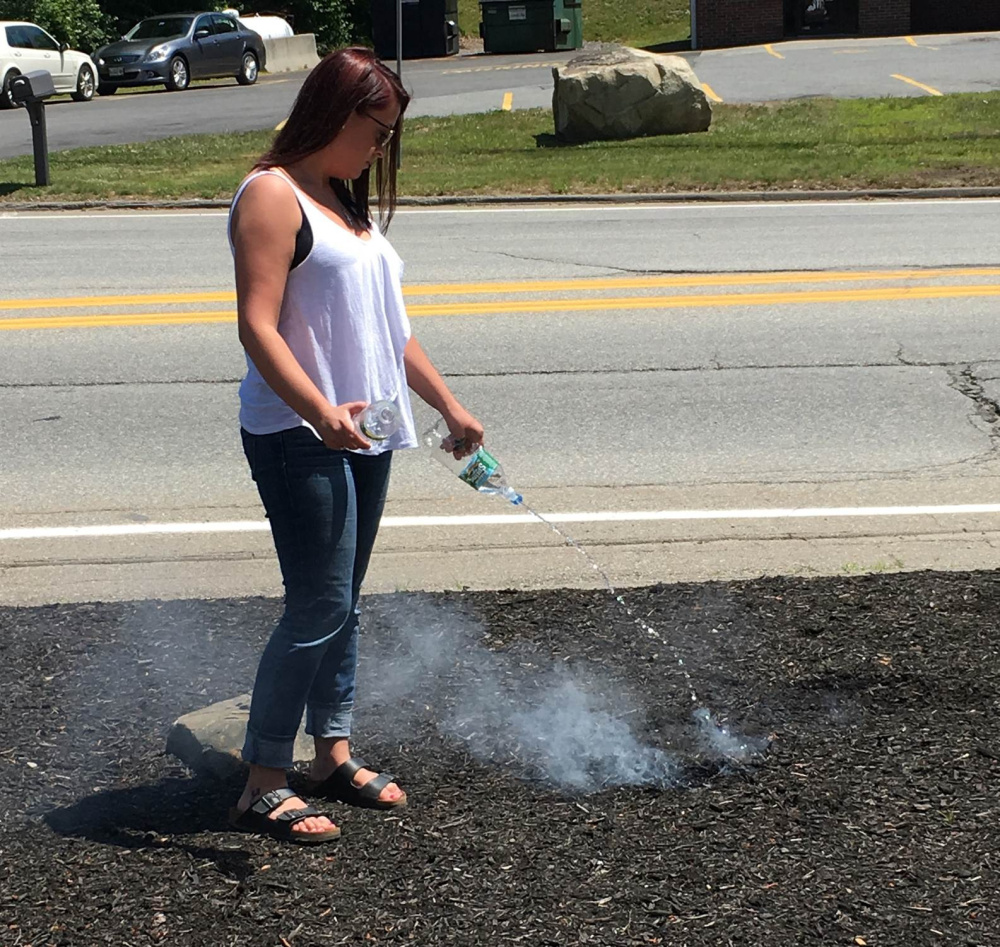AUGUSTA — In the early morning of June 18, Augusta firefighters responded to a call about smoke coming from under a deck at the State Farm building on Sewall Street.
The cause of the fire was something all too familiar to the department these days: bark mulch.
“It’s getting worse, and people do not care enough,” Augusta Fire Chief Roger Audette said. “People just flick their cigarettes and before you know it, something is smoldering.”
Audette said he’s getting frustrated by how often the department has to go to the Marketplace at Augusta or other places of business to put out bark mulch fires. “It’s driving up the cost of business, and market places are pulling our resources quite a bit,” Audette said.
In the last few weeks, the Augusta Fire Department was called to the Hannaford supermarket on Cony Street, Shaw’s Plaza on Western Avenue and MaineGeneral Medical Center to deal with smoldering bark mulch. Audette said his firefighters are handling 60 to 70 of such calls per year, a risk made even greater lately by a stretch of dry weather and less-than-average rainfall in Maine.
“We are constantly going to a lot of these places because people flick their cigarettes in there and then the areas are smoldering,” Audette said. “This stuff is basically fuel. We go out daily.”
Because of the increase in fighting these fires, Audette said his department is considering proposing ordinance changes to make businesses responsible for paying when the Fire Department goes to extinguish a mulch fire.
“Charging fees is something we are looking at,” Audette said. “I mean, if we’re going to the same shopping center multiple times, maybe it something to think about.”
Jordan Genest of Augusta used water bottles from her car to put out a mulch fire Friday afternoon at the Citgo station on Civic Center Drive. She said she was surprised nobody from the convenience store was outside taking care of it, considering fire and gas are an especially volatile mix.
“Does anybody from the store even know?” Genest asked.
Audette said that while the majority of these fires could be put out with a bucket of water, there is a risk of larger fires if certain safety precautions aren’t taken. Ideally, Audette said, businesses shouldn’t use bark mulch at all; but because it is less expensive and, some would say, more visually appealing, than crushed stone, it is still being used, especially at new businesses or buildings.
“That’s just bad practice from a safety perspective, but we see it annually,” Audette said. “The big driver in all of this for us is safety.”
Waterville and Winslow Fire Chief Dave LaFountain said he can understand Audette’s frustration. He agrees that some corrective action should be taken.
“There are some days where we have to send an engine across town several times for the same area where dry bark mulch has ignited,” LaFountain said. “I can’t understand why businesses that have decorative mulch applied to landscaped areas don’t water that area as part of its regular maintenance.”
Eric Conrad, spokesman for the Maine Municipal Association, said there is a trend statewide of municipalities looking for ways to curtail “frequent fliers” – people or businesses that are heavily demanding of police and fire-rescue departments – or charge them for what might be considered excessive use.
“All of the property taxpayers in a city pay for police and fire-rescue service, so if one person or business is using the fire department a whole lot, addressing that actually is in most taxpayers’ best interest,” Conrad said.
The practice goes back about a decade, Conrad said, when federal and state rescue people started charging adventure seekers for extremely expensive rescue operations when they were stranded during a mountain climbing or back-country skiing operation.
According to data provided by the state fire marshal’s office, 94 bark mulch fires were reported to that agency in 2015, up from 59 in the previous year.
State Fire Marshal Joseph Thomas said the careless disposal of cigarettes seems to be the main culprit in causing these fires. He said local chiefs sometimes contact him to ask whether any bark mulch has been recalled because of spontaneous combustion, though he had no information about any specific problems.
Send questions/comments to the editors.



Success. Please wait for the page to reload. If the page does not reload within 5 seconds, please refresh the page.
Enter your email and password to access comments.
Hi, to comment on stories you must . This profile is in addition to your subscription and website login.
Already have a commenting profile? .
Invalid username/password.
Please check your email to confirm and complete your registration.
Only subscribers are eligible to post comments. Please subscribe or login first for digital access. Here’s why.
Use the form below to reset your password. When you've submitted your account email, we will send an email with a reset code.